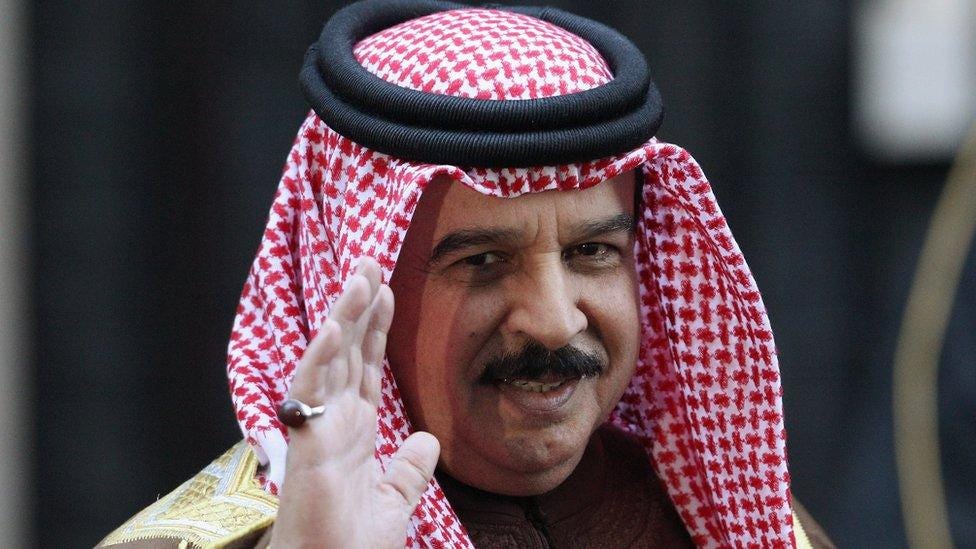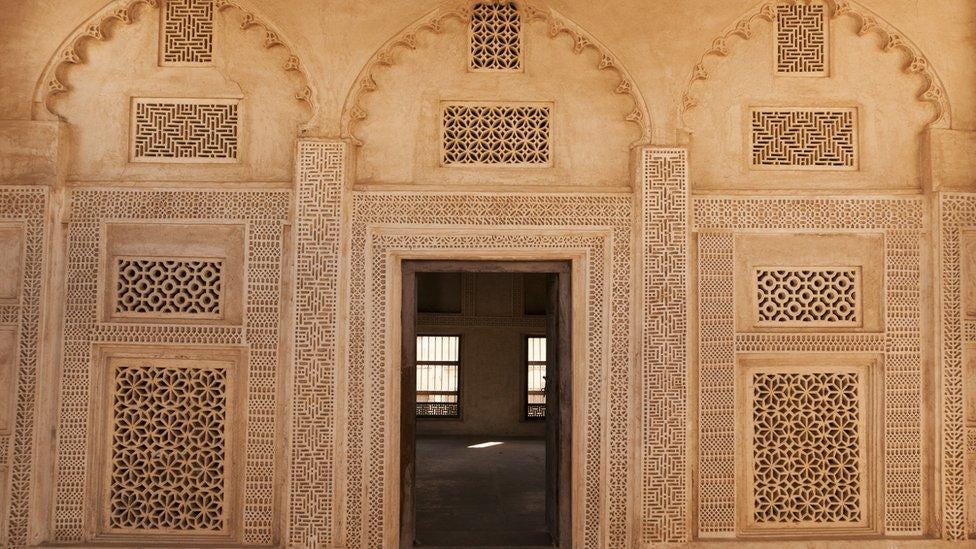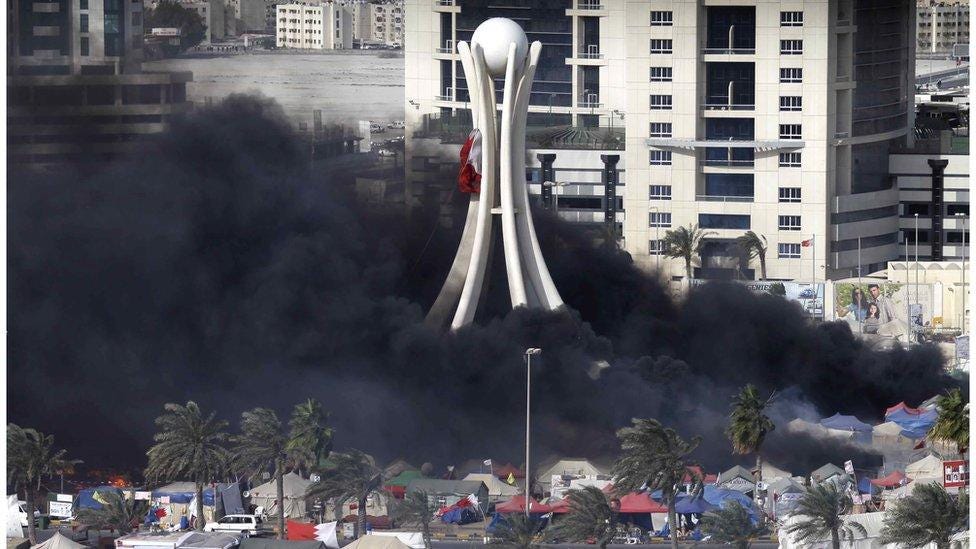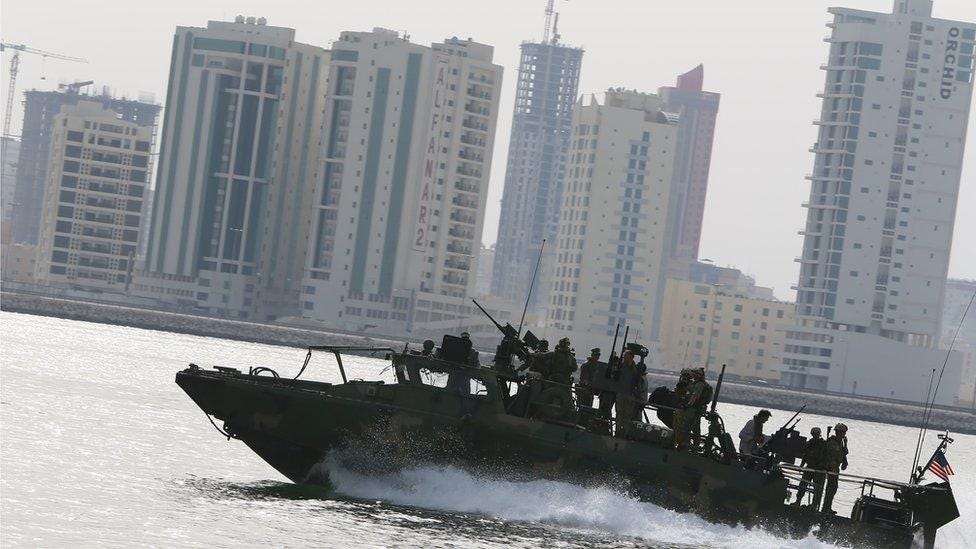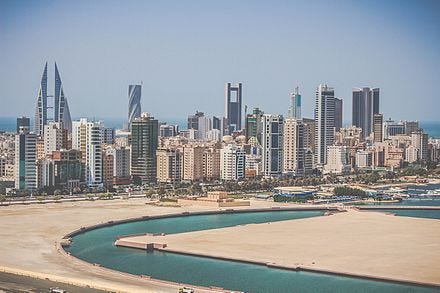Bahrain country profile
The economy of Bahrain is heavily dependent upon oil and gas. The Bahraini Dinar is the second-highest-valued currency unit in the world.
Bahrain was one of the first states in the Gulf to discover oil and to build a refinery. It never reached the levels of production enjoyed by Kuwait or Saudi Arabia, and so has had to diversify its economy.
The country is ruled by a Sunni king, whose family holds the main political and military posts. The divide between the Shia majority and the Sunni rulers has led to long-running tension, which has sporadically boiled over into civil disobedience.
Bahrain was once viewed as a promising model for political reform and democratic transition, but since crushing a popular prodemocracy protest movement in 2011, the monarchy has systematically eliminated a broad range of political rights and civil liberties.
KINGDOM OF BAHRAIN: FACTS
Capital: Manama
Area: 786.5 sq km
Population: 1.4 million
Languages: Arabic, also English
Life expectancy: 78 years (men) 80 years (women)
LEADER
King: Sheikh Hamad bin Isa Al Khalifah
Sheikh Hamad, who has led the country since 1999, changed his title from emir to king when Bahrain became a kingdom in 2002.
Born in 1950, he was educated at a public school in Cambridge and went on to study at Mons Officer Cadet School in Aldershot in the UK and at the US Army Command and Staff College at Fort Leavenworth.
Under his leadership, the country has faced protests and civil unrest from the Shia majority, with demonstrators saying the ruling Sunni minority shuts them out of housing, healthcare and government jobs.
MEDIA
The media are under tight official control. The main TV and radio networks are state-run and newspapers follow a pro-government editorial line.
Media watchdog Freedom House says legislation is used to detain or jail critical journalists and online activists.
Bahrain has one of the highest rates of internet penetration in the Arab world.
TIMELINE
Image caption,
The Pearl Square monument became a symbol of democracy during the 2011 protests and was subsequently demolished
Some key dates in Bahrain's history:
1602-1783 - Persian rule.
1783 - Rule by sheikhs of the Khalifah family.
1861 - Britain assumes responsibility for the Bahrain's defence and foreign relations.
1913 - Britain and the Ottoman government sign a treaty recognising the independence of Bahrain but the country remains under British administration.
1931 - The Bahrain Petroleum Company (Bapco), a subsidiary of the Standard Oil Company of California (Socal), discovers oil at Jabal al-Dukhan and production begins the following year.
1967 - Britain moves its main regional naval base from Aden to Bahrain, a year before deciding to close all its bases east of Suez by 1971.
1970 - Iran under the shah renounces claims to Bahrain, but the successor Islamic Republic of Iran does not recognise this renunciation.
1971 - Bahrain declares independence and signs a new treaty of friendship with Britain. Sheikh Isa becomes the first emir and the council of state becomes a cabinet.
1981 - Bahrain joins the Gulf Cooperation Council (GCC), which also includes Kuwait, Oman, Qatar, Saudi Arabia and the United Arab Emirates.
1986 - Opening of the King Fahd causeway which links Bahrain to the mainland of Saudi Arabia.
1991 - Bahrain signs a defence cooperation agreement with the United States, providing for port facilities and joint military exercises.
2001 - Referendum on political reform; Bahrainis overwhelmingly back proposals under which Bahrain would become constitutional monarchy with elected lower chamber of parliament and independent judiciary.
2011 - Protesters gather in Manama, inspired by popular revolts that toppled rulers in Tunisia and Egypt. Saudi troops take part in a crackdown.
2018 - Bahrain reports discovery of the kingdom's largest oilfield in more than 80 years.
Opposition leader Sheikh Ali Salman of the banned Al-Wefaq party is sentenced to life in jail on charges of spying for Bahrain's rival, Qatar. Rights organisations criticise the trial as politically-motivated.
Image caption,
Bahrain is home to the US Navy's Fifth Fleet
The BBC
Overview
Bahrain, officially the Kingdom of Bahrain, is an island country in West Asia. It is situated on the Persian Gulf, and comprises a small archipelago made up of 50 natural islands and an additional 33 artificial islands, centered on Bahrain Island which makes up around 83 percent of the country's landmass.
...
Wikipedia
CO2 emissions per capita
24.89 metric tons (2022)
World Bank
About
Fertility rate: 1.80 births per woman (2022) World Bank
GDP growth rate: 3.0% annual change (2023) World Bank
Gross domestic product: 46.08 billion USD (2023) World Bank
GDP per capita: 29,218.86 USD (2023) World Bank
Gross national income: 94.47 billion PPP dollars (2023) World Bank
Economy of Bahrain
Article Talk
The economy of Bahrain is heavily dependent upon oil and gas. The Bahraini Dinar is the second-highest-valued currency unit in the world. Since the late 20th century, Bahrain has heavily invested in the banking and tourism sectors. The country's capital, Manama is home to many large financial structures. Bahrain's finance industry is very successful. In 2008, Bahrain was named the world's fastest growing financial center by the City of London's Global Financial Centres Index. Bahrain's banking and financial services sector, particularly Islamic banking, have benefited from the regional boom driven by demand for oil. Petroleum is Bahrain's most exported product, accounting for 60% of export receipts, 70% of government revenues, and 11% of GDP. Aluminium is the second most exported product, followed by finance and construction materials.
Economy of
Bahrain
Manama skyline
Currency
Bahraini dinar (BHD)
Fiscal year
Calendar Year
Trade organisations
WTO and GCC
Country group
Developing/Emerging
High-income economy
Statistics
Population
Neutral increase 1,577,059 (2023)
GDP
Increase $47.8 billion (nominal, 2024 est.)
Increase $105.6 billion (PPP, 2024 est.)
GDP rank
94th (nominal, 2024)
99th (PPP, 2024)
GDP growth
Decrease 3.0% (2023)
Steady 3.0% (2024e)
Increase 3.2% (2025f)
Decrease 2.9% (2026f)
GDP per capita
Increase $29,893 (nominal, 2025 est.)
Increase $66,975 (PPP, 2025 est.)
Source:Wikipedia




